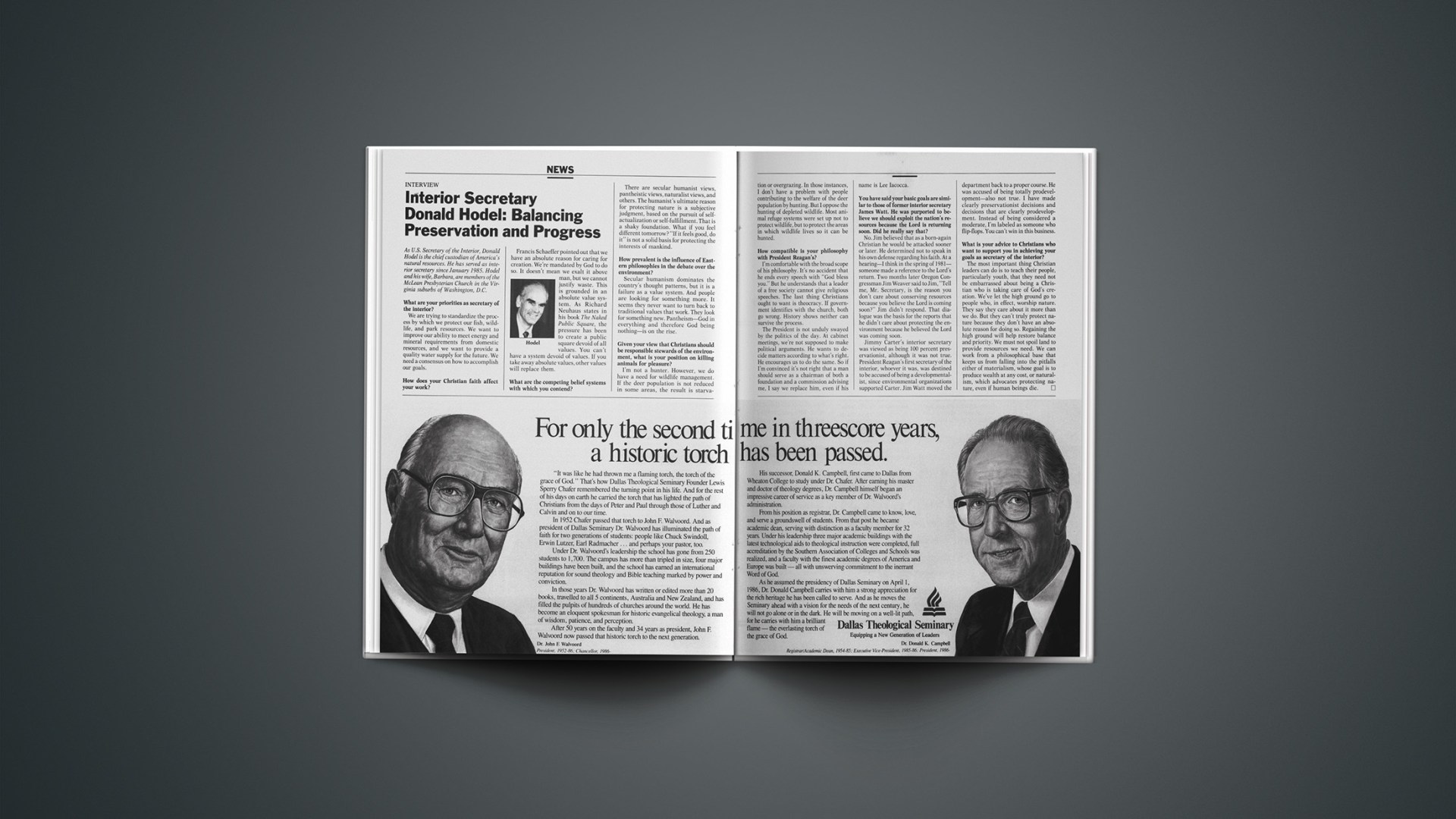As U.S. Secretary of the Interior, Donald Hodel is the chief custodian of America’s natural resources. He has served as interior secretary since January 1985. Hodel and his wife, Barbara, are members of the McLean Presbyterian Church in the Virginia suburbs of Washington, D.C.
What are your priorities as secretary of the interior?
We are trying to standardize the process by which we protect our fish, wildlife, and park resources. We want to improve our ability to meet energy and mineral requirements from domestic resources, and we want to provide a quality water supply for the future. We need a consensus on how to accomplish our goals.
How does your Christian faith affect your work?
Francis Schaeffer pointed out that we have an absolute reason for caring for creation. We’re mandated by God to do so. It doesn’t mean we exalt it above man, but we cannot justify waste. This is grounded in an absolute value system. As Richard Neuhaus states in his book The Naked Public Square, the pressure has been to create a public square devoid of all values. You can’t have a system devoid of values. If you take away absolute values, other values will replace them.
What are the competing belief systems with which you contend?
There are secular humanist views, pantheistic views, naturalist views, and others. The humanist’s ultimate reason for protecting nature is a subjective judgment, based on the pursuit of self-actualization or self-fulfillment. That is a shaky foundation. What if you feel different tomorrow? “If it feels good, do it” is not a solid basis for protecting the interests of mankind.
How prevalent is the influence of Eastern philosophies in the debate over the environment?
Secular humanism dominates the country’s thought patterns, but it is a failure as a value system. And people are looking for something more. It seems they never want to turn back to traditional values that work. They look for something new. Pantheism—God in everything and therefore God being nothing—is on the rise.
Given your view that Christians should be responsible stewards of the environment, what is your position on killing animals for pleasure?
I’m not a hunter. However, we do have a need for wildlife management. If the deer population is not reduced in some areas, the result is starvation or overgrazing. In those instances, I don’t have a problem with people contributing to the welfare of the deer population by hunting. But I oppose the hunting of depleted wildlife. Most animal refuge systems were set up not to protect wildlife, but to protect the areas in which wildlife lives so it can be hunted.
How compatible is your philosophy with President Reagan’s?
I’m comfortable with the broad scope of his philosophy. It’s no accident that he ends every speech with “God bless you.” But he understands that a leader of a free society cannot give religious speeches. The last thing Christians ought to want is theocracy. If government identifies with the church, both go wrong. History shows neither can survive the process.
The President is not unduly swayed by the politics of the day. At cabinet meetings, we’re not supposed to make political arguments. He wants to decide matters according to what’s right. He encourages us to do the same. So if I’m convinced it’s not right that a man should serve as a chairman of both a foundation and a commission advising me, I say we replace him, even if his name is Lee Iacocca.
You have said your basic goals are similar to those of former interior secretary James Watt. He was purported to believe we should exploit the nation’s resources because the Lord is returning soon. Did he really say that?
No. Jim believed that as a born-again Christian he would be attacked sooner or later. He determined not to speak in his own defense regarding his faith. At a hearing—I think in the spring of 1981—someone made a reference to the Lord’s return. Two months later Oregon Congressman Jim Weaver said to Jim, “Tell me, Mr. Secretary, is the reason you don’t care about conserving resources because you believe the Lord is coming soon?” Jim didn’t respond. That dialogue was the basis for the reports that he didn’t care about protecting the environment because he believed the Lord was coming soon.
Jimmy Carter’s interior secretary was viewed as being 100 percent preservationist, although it was not true. President Reagan’s first secretary of the interior, whoever it was, was destined to be accused of being a developmentalist, since environmental organizations supported Carter. Jim Watt moved the department back to a proper course. He was accused of being totally prodevelopment—also not true. I have made clearly preservationist decisions and decisions that are clearly prodevelopment. Instead of being considered a moderate, I’m labeled as someone who flip-flops. You can’t win in this business.
What is your advice to Christians who want to support you in achieving your goals as secretary of the interior?
The most important thing Christian leaders can do is to teach their people, particularly youth, that they need not be embarrassed about being a Christian who is taking care of God’s creation. We’ve let the high ground go to people who, in effect, worship nature. They say they care about it more than we do. But they can’t truly protect nature because they don’t have an absolute reason for doing so. Regaining the high ground will help restore balance and priority. We must not spoil land to provide resources we need. We can work from a philosophical base that keeps us from falling into the pitfalls either of materialism, whose goal is to produce wealth at any cost, or naturalism, which advocates protecting nature, even if human beings die.
NORTH AMERICAN SCENE
ACTIVISM
Stores Drop Pornography
Pressure from a citizen’s group in Virginia helped persuade an East Coast drug store chain, Peoples Drug Stores, to stop selling magazines such as Playboy and Penthouse.
Richard Enrico, organizer of Citizens Against Pornography, began the campaign early this year by printing 30,000 flyers listing the names and addresses of corporate executives of Peoples and another drug store chain. “I asked that people write to them, call them once a week, and ask their Bible study members, family, and friends to do the same,” Enrico said.
He met with local pastors, asking them to support his effort from the pulpit and through church newsletters. According to a spokesman for Peoples Drug, the volume of letters complaining about pornographic magazines in the chain’s 810 stores increased, and company officials began considering whether these magazines violated community standards of morality.
Enrico’s effort gained the support of Virginia Gov. Gerald L. Baliles and Washington Redskins coach Joe Gibbs. “Both Republicans and Democrats like the Redskins,” Enrico said, so Gibbs’s support was “better than an endorsement from the President.” The group next plans to target the 7-Eleven convenience store chain.
CANADA
Lesbian Deacons Suspended
Two self-avowed lesbians have been suspended from their duties as deacons in the Anglican Church of Canada.
Joyce Barnett and Allison Kemper, who were already on official leave from Holy Trinity Church in Toronto, were suspended for violating the church’s standard of morality. According to Canadian Press news service, Barnett is pregnant, and the two women have said they are living together. They say they plan to raise the baby as part of their family.
The Anglican Church of Canada does not recognize the union of homosexuals, and it condemns sex outside of marriage and bearing children out of wedlock. In 1979, Canada’s Anglican House of Bishops ruled that homosexual ministers must abstain from sexual activity. In the Anglican Church of Canada, deacons are licensed to conduct various services, including marriage, but they cannot celebrate the Eucharist.
EMPLOYMENT
Ignoring a Court Ruling
A judge in Minneapolis has imposed a $300-per-day fine on a chain of health clubs that favors conservative Christians in its employment policies. Arthur Owens, president of Sports and Health Club, Inc., said he prefers to pay the daily fines rather than change his company’s employment practices.
“It’s well worth $300 a day to be able to seek out people who agree with our goals and values,” Owens said. His chain of seven fitness clubs refuses to hire anyone who is “antagonistic to the gospel.” It also prohibits the employment of anyone “who is openly violating the Word of God or the laws of the state.”
In 1984 a Minnesota administrative law judge found the company in violation of the state’s Human Rights Act, which prohibits discrimination on the basis of religion. When the fitness club chain continued to ignore the judge’s finding, Hennepin County District Court Judge Franklin Knoll found the company in contempt of court and imposed the daily fines. Elizabeth Cutter, a special assistant attorney general, said the Minnesota Human Rights Department might seek another contempt citation if the health club chain continues to pay the daily fines and ignores the court order.
Owens contends that his company’s hiring practices are protected under the First Amendment’s guarantee of free exercise of religion. The Minnesota Supreme Court rejected that argument last year in a 6-to-2 ruling. Owens appealed the ruling to the U.S. Supreme Court. The high court has not indicated whether it will hear the case.
OPINION POLLS
State Aid to Church Schools
Two polls conducted by the Princeton Religion Research Center indicate the American public is evenly divided over the issue of government financial aid to parochial schools.
One of the polls surveyed opinions on the desirability of a constitutional amendment allowing state aid to parochial schools. The other surveyed views on a proposed federal voucher system that would help parents pay tuition costs for children in parochial schools.
On the constitutional amendment, the survey found 45 percent of the respondents in favor, 47 percent opposed, and 8 percent with no opinion. A voucher system was supported by 45 percent of those questioned, opposed by 40 percent, and did not matter to 15 percent.
The poll on vouchers, based on in-person interviews with 1,528 adults, could have a sampling error of up to 3 percent. The survey on the amendment, based on telephone interviews with 1,009 adults, has a possible sampling error of 4 percent.
PEOPLE AND EVENTS
Briefly Noted
Awarded: The Templeton Prize for Progress in Religion to James I. McCord, former president of Princeton Theological Seminary. McCord was recognized for founding the Center of Theological Inquiry, a research center in Princeton, New Jersey. The prize, which carries a cash award of about $250,000, is sponsored by financier John M. Templeton, a Presbyterian elder. The 13 previous winners of the award include Mother Teresa of Calcutta, evangelist Billy Graham, and Russian writer Alexander Solzhenitsyn.
Founded: The International Coalition of Sports Ministers, an umbrella organization including leaders of church and Parachurch sports ministries. The coalition will attempt to promote greater understanding between church and Parachurch ministries, and will cooperate on major efforts such as evangelistic outreach at the 1988 Olympics in Seoul, South Korea. Florida pastor David Burnham was appointed chairman of the organization.









